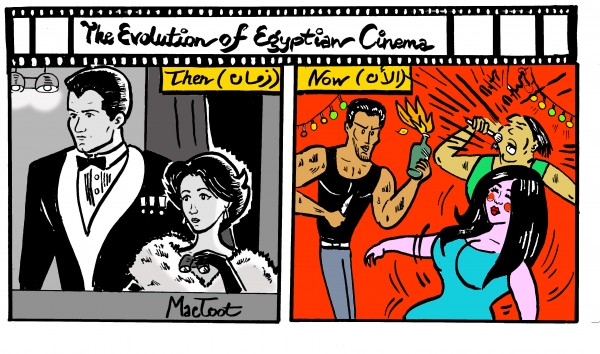Is Egypt Still the ‘Hollywood of the Middle East’?
BY ENGY ALY
@EngyAly7
![Far more romantic films were produced during the golden age of cinema than in the past 20 or 30 years. [Mahmoud Shaltout]](http://www.auccaravan.com/wp-content/uploads/2015/12/Egyptian-cinema-final-e1450887536691.jpg)
A list of the top 100 Arabic films published by the Dubai International Film Festival (DIFF) in 2013, is largely comprised of Egyptian movies produced between the 1940s and the 1960s.
Not surprisingly, this is known today as the “golden age” of Egyptian cinema.
In contrast, very few Egyptian movies released in the past two decades were able to compete in the Arab film industry. There were 35 movies on the list from the 40s-60s as opposed to only three from the 90s onward.
The drastic decline in the quality of cinema across time came with the changes in the Egyptian social fabric, as well as the general attitude of a changing society.
Even though movies are staged, the daily conduct and livelihoods of the characters help to reflect the norms and beliefs of a certain period in the social history of a nation.
This alone is a strong indication of the cultural and societal drift that has marked Egyptian cinematic history.
According to Sherif Borei, author of Cinema Cairo: The Golden Ages in the Egyptian Cinema, in 1950, Egyptian cinema was the third largest in the world, after the United States and India.
During these golden ages, Egypt was one of the biggest exporters of films to the region and became an important source of popular culture to the Arab world.
He claims that this burgeoning industry was bred on cosmopolitan talent, and the cultural fusion that is Egypt. “Cinema becomes reality, mirroring society and molding it,” said Borei.
For much of the 1950’s, Egyptian cinema was strongly influenced by the events of the 1952 revolution. The film industry was now churning out the propaganda of state politics and patriotism.
A good example of this new relationship can be found in the string of post-1952 comedies starring iconic funny man Ismail Yassin.
Sign of the Times
Like most art forms, Egyptian cinema has traditionally reflected the public’s mood. Sometimes, a film’s production date was sufficient to reveal what was going on in the country at the time.
In contrast, far more romantic films were produced during the golden age of cinema than in the past 20 or 30 years – perhaps indicating a more emotional, yet hopeful society in the 1940s-60s period.
Egyptian actress Mervat Amin told The Caravan that she believes this difference is due to a dichotomy of generations.
“I believe that every theme of movies reflects on the era as well as the generation living at its time, for example, black and white movies incorporated themes of romance, emotions, betrayal, and sacrifices [..] because people’s emotions were the most potent aspect when film-making, therefore, filmmakers focused on appealing to these emotions,” she said.
Egyptian director Sherif Arafa believes that despite the drastic decline in movies since the golden age, Cairo remains the Hollywood of the Middle East.
“But I believe that directors and producers have to keep up with constant cultural and societal changes in order for the demand for films to be high, and for the people to relate to the movie they’re watching,” he said.
He added that the health of Egypt’s economy and the considerably smaller budgets that run movies today, partially caused by the nationalization of the cinema, played an important role in this change.
“[In the aftermath of] the January 25 Revolution, there was a clear budget cut for cinemas,” Arafa said.
But the prevalence of private production companies in the past 40 years is also a major factor behind the shift in cinema output.
“In the 1950s and 60s, the government heavily funded the cinema industry because they believed that having high quality films with good content would be prestigious to Egypt and would show the world who we are and what we do as Egyptians,” Zaki told The Caravan.
“But now, the private sectors are the ones who fund the industry, and their main goal is one thing and one thing only: profit,” he added.
Zaki also explained that actors nowadays only care about their own benefit and not about the image of the Egyptian cinema as a whole; they focus on gaining series rather than films, because they get paid more since TV series are usually 30 episodes long.”
But some see the continuing comparisons between the industry now and then as an unfair reflection of modern cinema.
Actor Ahmed Helmy says that the types of social issues that exist today may not have 60 years ago.
He believes that most audiences would rather be entertained with movies that carry no message in particular rather than something realistic that reminds them of the ills they endure.
“You can’t blame the Egyptian cinema today for making movies with a lack of powerful content, because this is what most Egyptians want to see now,” Helmy told The Caravan.
But there are those in the industry who do in fact blame Egyptian cinema for what they see as moral degeneration of our society.
“The first thing that comes to mind when I think of how the cinema influences our society today is the difference between romantic movies now and back in the 50s,” says Mariam Naoum, an Egyptian screenwriter.
She particularly blames filmmakers for the negative portrayal of women as sex objects and men as thugs in low budget films.
Is this a fair representation of contemporary society?
“Filmmakers need to understand that Egyptian identity is reflected through cinema, and they need to be more careful what kind of image they broadcast to the rest of the world,” Naoum said.
“Egyptian identity deserves to be protected.”




